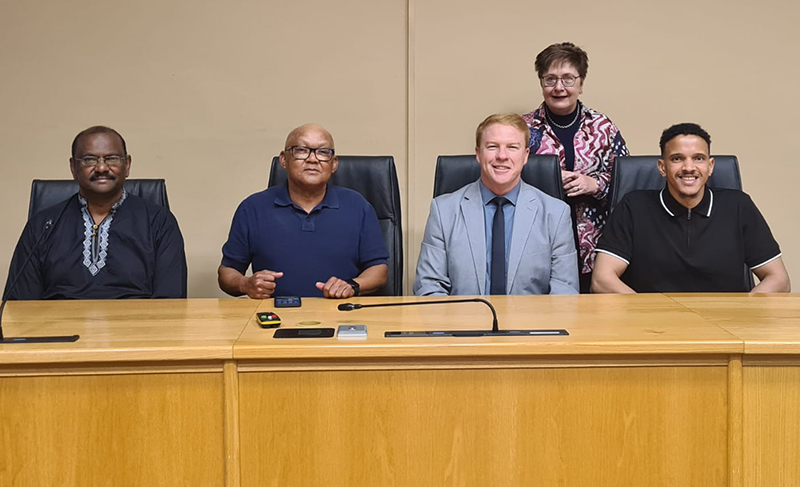Staff members, students and stakeholders of the North-West University (NWU) gathered on the Potchefstroom Campus on 2 October to celebrate the launch of the second edition of the book Community Psychology: Global Crisis, Local Realities, and Action Global Crises.
The event highlighted the collaborative spirit underpinning the publication, with several contributors offering concise presentations that illustrated how their chapters collectively reinforce the book’s central theme of global interconnectedness and its relevance to community psychology in contemporary contexts.
The second edition was edited by Prof Norman Duncan, Prof Vera Roos and Prof Jace Pillay. Prof Duncan is an extraordinary professor at the NWU, Prof Roos is a socio-gerontologist, and Prof Pillay holds the South African Research Chair in Education and Care in Childhood and serves as the UNESCO Chair in Mental Health and Psychological Support for Teachers and Learners at the University of Johannesburg.
The editors expressed their gratitude to Prof Mirna Nel, deputy dean for research and innovation in the Faculty of Humanities, for her invaluable support, as well as to the School of Human and Community Development at the University of the Witwatersrand.
They also acknowledged the collaborative efforts of 23 co-authors from various disciplines within the social sciences whose diverse perspectives enriched the depth and interdisciplinary scope of the volume.
Reflecting on the process, Prof Duncan explained that this new edition has been updated and transformed. “The communities that we addressed in the community psychology book of 2007 are different from the communities we have to address in contemporary society.”
Prof Roos highlighted what makes this volume unique. “This publication interrogates traditional frameworks while focusing on epistemic justice and inclusive knowledge production. It expands the capacity of community psychologists to address histories of exclusion, marginalisation and equality.”
Themes and structure of the book
The book explores how community psychology is evolving to address emerging themes such as decolonisation, climate change, justice and digital activism. It aims to foster collaboration between students, researchers, activists and practitioners to promote global interconnectedness.
The book is organised into 17 chapters and four sections, covering the history of community psychology, as well as contemporary issues such as digital communities, climate change emergencies, gendered poverty, intergenerational dynamics and various interventions in teaching, learning and research.
This volume provides a broader perspective on the complexities that community psychology faces, as it is grounded in case studies and critical reflections on practice. The inclusion of research further demonstrates how community psychology operates in real-world contexts and how theories and methods can be mobilised to support collective well-being and social justice.
Prof Pillay, speaking on Section 4, which focuses on teaching, learning and research, emphasised its connection to the slogan “think globally and act locally”. He pointed out how decolonisation continues to influence academic curricula and daily professional practices.
Dr Jeffrey Yen from the University of Guelph stressed the value of historical thinking for community psychologists, while Prof Curwyn Mapaling from the NWU’s Psychology subject group delivered a critical overview of the book. He singled out two chapters that stood out: Chapter 6: Towards rehumanisation and overcoming gendered poverty by Puleng Segolo and Lesego Plank, and Chapter 9: People experiencing houselessness by Janice Frank and Thokozile Mayekiso.
The book is available for purchase through Van Schaik: COMMUNITY PSYCHOLOGY Global Crises, Local Realities, and Action

From left are Prof Jace Pillay, Prof Norman Duncan, continuity presenter GP van Rheede van Oudtshoorn, Prof Vera Roos and Prof Curwyn Mapaling.
